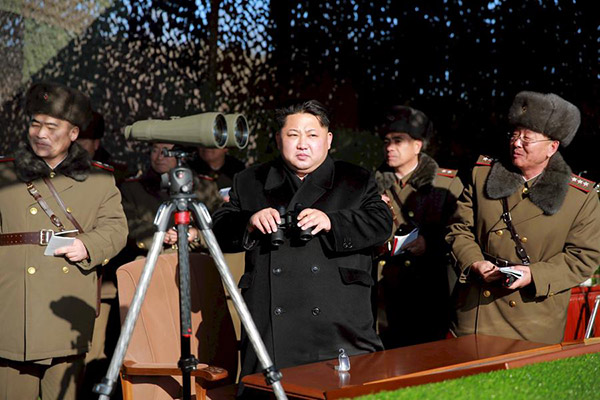 |
|
DRPK leader Kim Jong-un (C) watches a firing contest of the KPA artillery units at undisclosed location in this photo released by DPRK's Korean Central News Agency (KCNA) in Pyongyang, Jan 5, 2016. [Photo/Agencies] |
In a televised address on Jan 13, Republic of Korea President Park Geun-hye urged the international community to strongly respond to the Democratic People's Republic of Korea's recent claim of testing a hydrogen bomb.
She also said the ROK is discussing with the United States countermeasures to prevent the DPRK from conducting more nuclear tests, and emphasized that her country will impose the strongest sanctions on the DPRK in a bid to force it to change its behavior.
Two days before Park's address, the ROK had already hinted that further US "strategic assets" might be deployed on the Korean Peninsula, following a "flyover by a US B-52 bomber" over Osan Air Base, about 70km south of the inter-Korean border in a show of strength.
Pyongyang's claim of testing a hydrogen bomb on Jan 6, the fourth nuclear test since 2006, which was strongly condemned by Washington and Seoul, shows that the peninsula issue is close to reaching a tipping point.
The peninsula nuclear issue has been a sore point in regional affairs for years. Now, it is becoming the biggest uncertainty in Northeast Asia, because Pyongyang's latest nuclear test has made clear its increasingly aggressive resolve to realize its nuclear goal, even by ignoring global efforts, including UN resolutions and international sanctions against the DPRK, to denuclearize the Korean Peninsula.
But, to a certain extent, the DPRK's obsession with developing nuclear weapons has a lot to do with its pursuit of national security, especially because it believes that it faces grave military threats and lacks effective countermeasures for self-protection.
Apparently, Pyongyang has lost faith in trading its nuclear development for security and continues developing nuclear weapons as an ultimate defense strategy, even if it is wrong to do so. In regard to its nuclear issue, a "legacy" of the Cold War that still plays a key role in the DPRK's national development and security, the beleaguered country until recently was ready to compromise on the premise that the US would guarantee its security and normalize diplomatic ties with it.
For the time being at least, Pyongyang has "succeeded" in convincing the international community that its nuclear-first policy is final. A more worrying fact is Pyongyang's increasingly irregular responses to latent security challenges, and its enduring resistance to all the pressures and sanctions.
As a major shareholder in the Korean Peninsula affairs and a key to the settlement of the nuclear issue, the US is yet to recalibrate its not-so-successful "strategic patience" policy. China as a responsible power in Asia and a permanent member of the UN Security Council, has reiterated its unambiguous stance on the Korean Peninsula's denuclearization. China has made it clear to Pyongyang that its desperate nuclear program will not only backfire, but also threaten its neighbors' security.
However, it's not China's job alone to prevent the grave damages and safeguard regional security and prosperity.
The long-stalled Six-Party Talks which involve the DPRK, the US, the ROK, China, Japan and Russia, as well as the UN Security Council's futile economic sanctions to deter Pyongyang from its nuclear ambitions have worn out relevant parties. However, the talks are the only way to peacefully resolve the nuclear issue, and no one should wait any longer.
The author is a professor at Yanbian University, Jilin province.

I’ve lived in China for quite a considerable time including my graduate school years, travelled and worked in a few cities and still choose my destination taking into consideration the density of smog or PM2.5 particulate matter in the region.